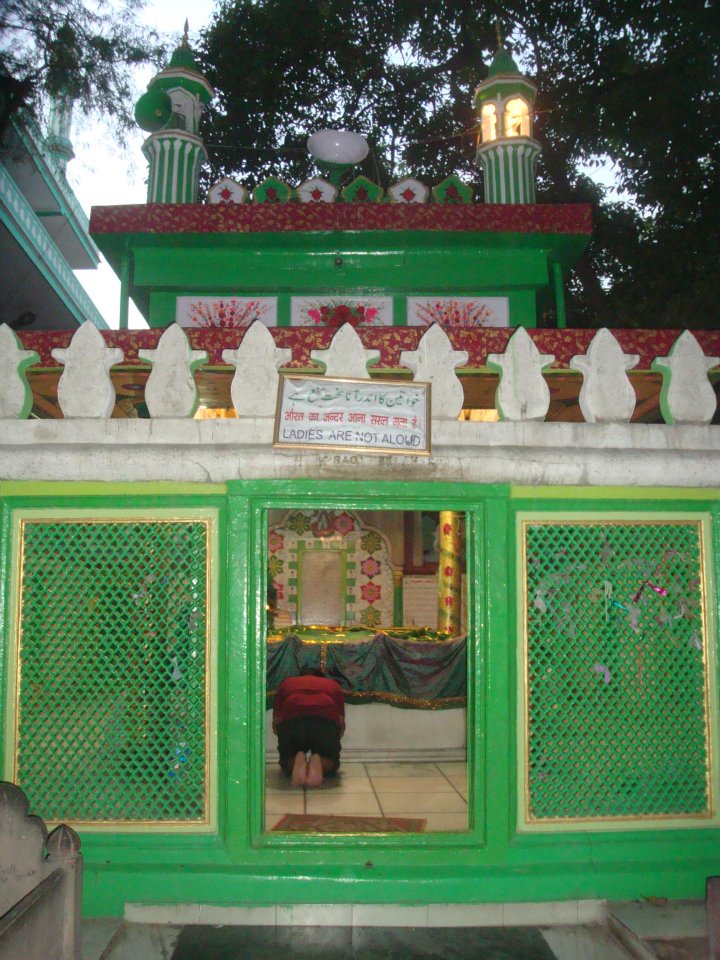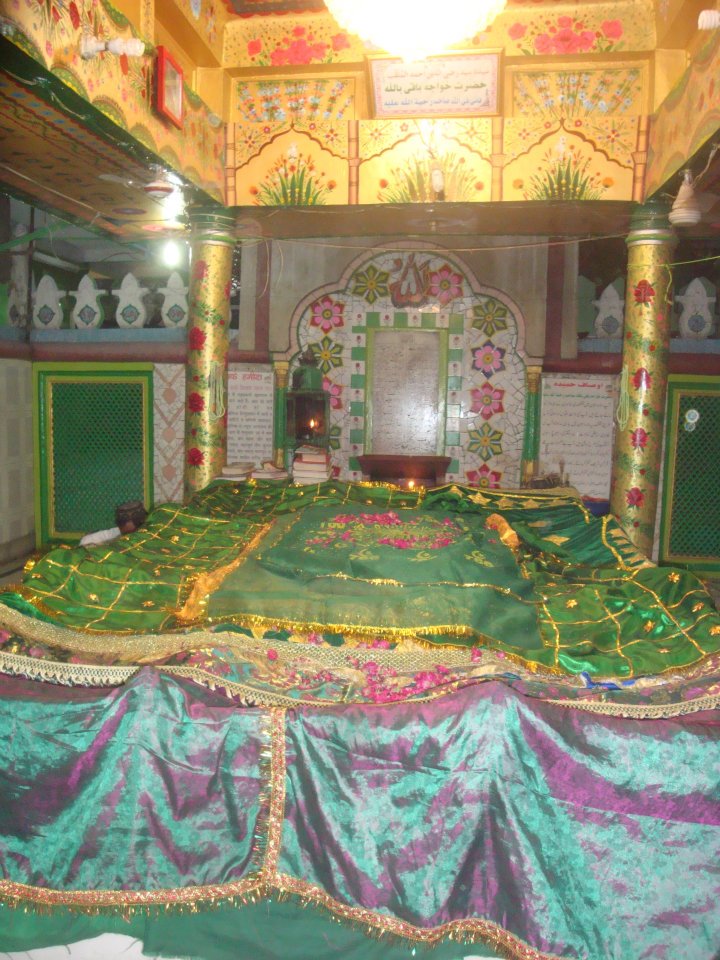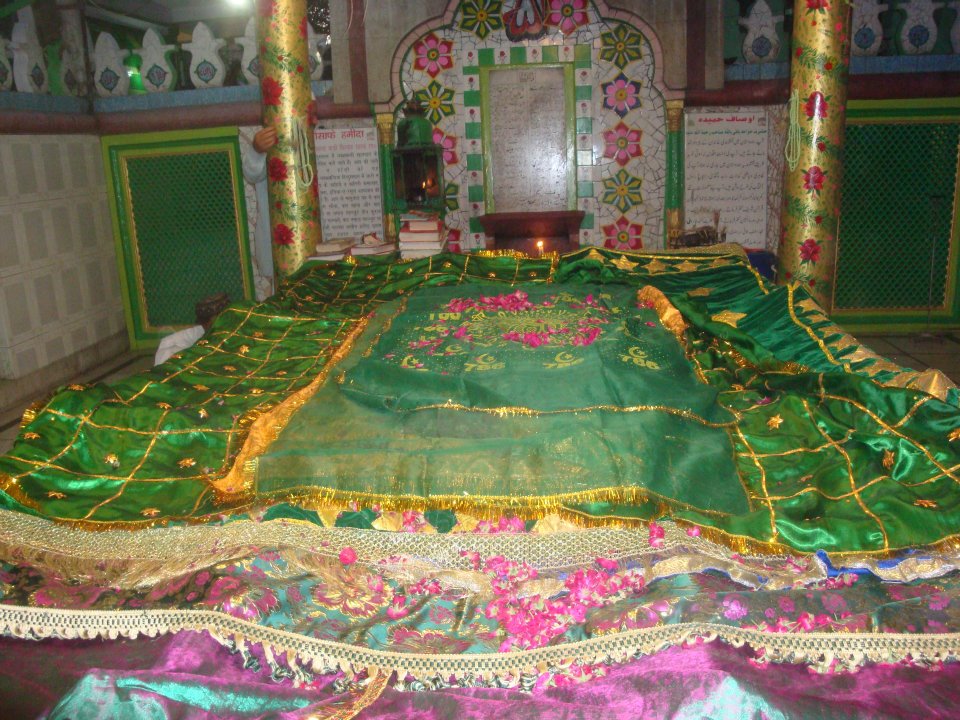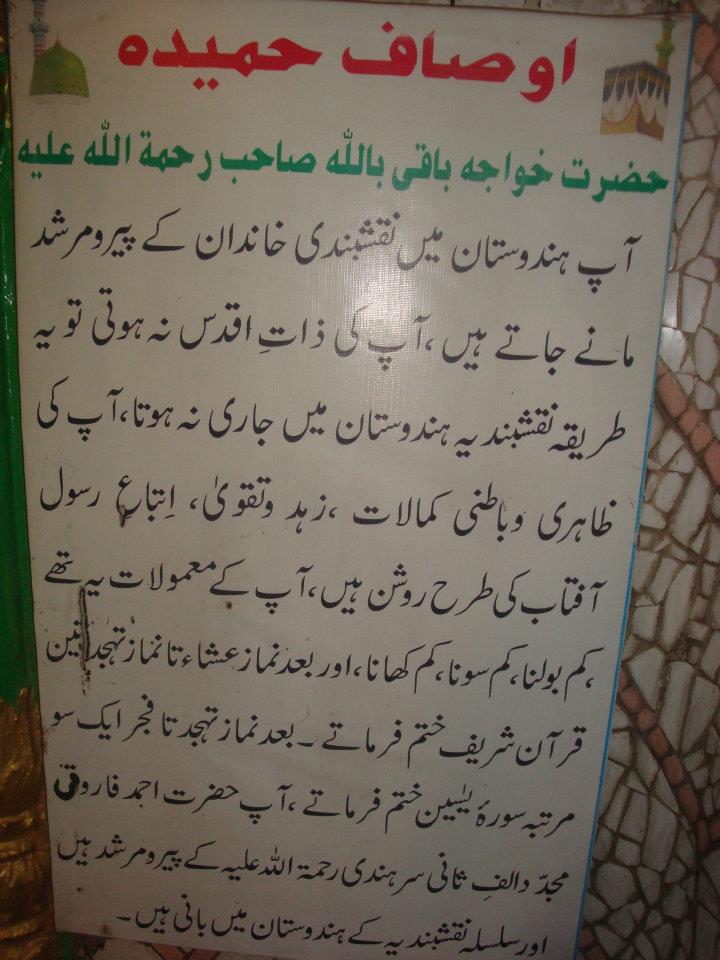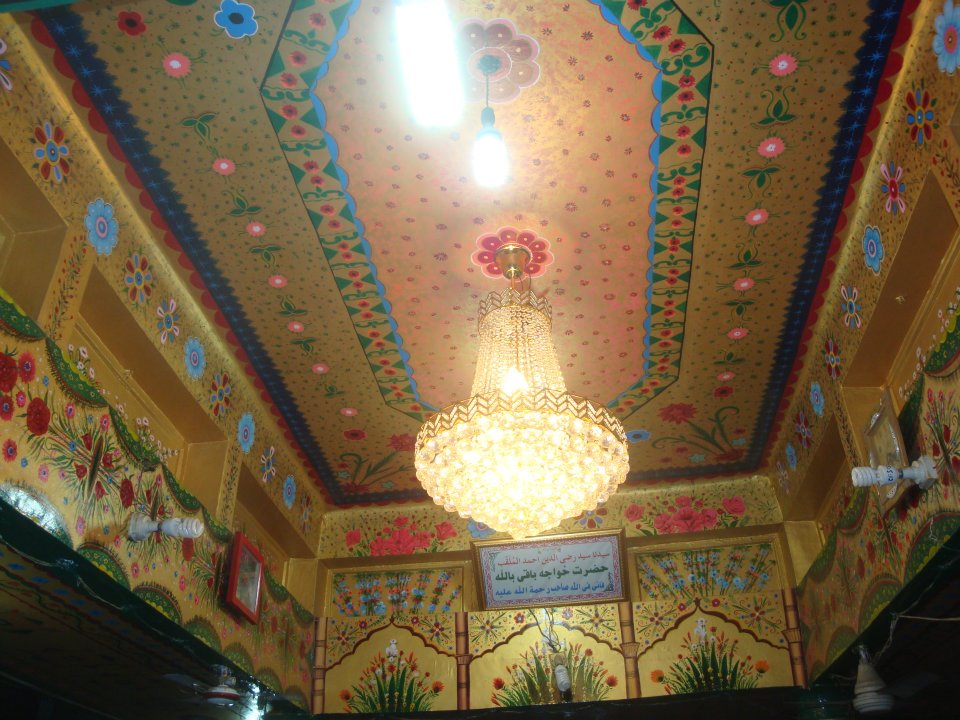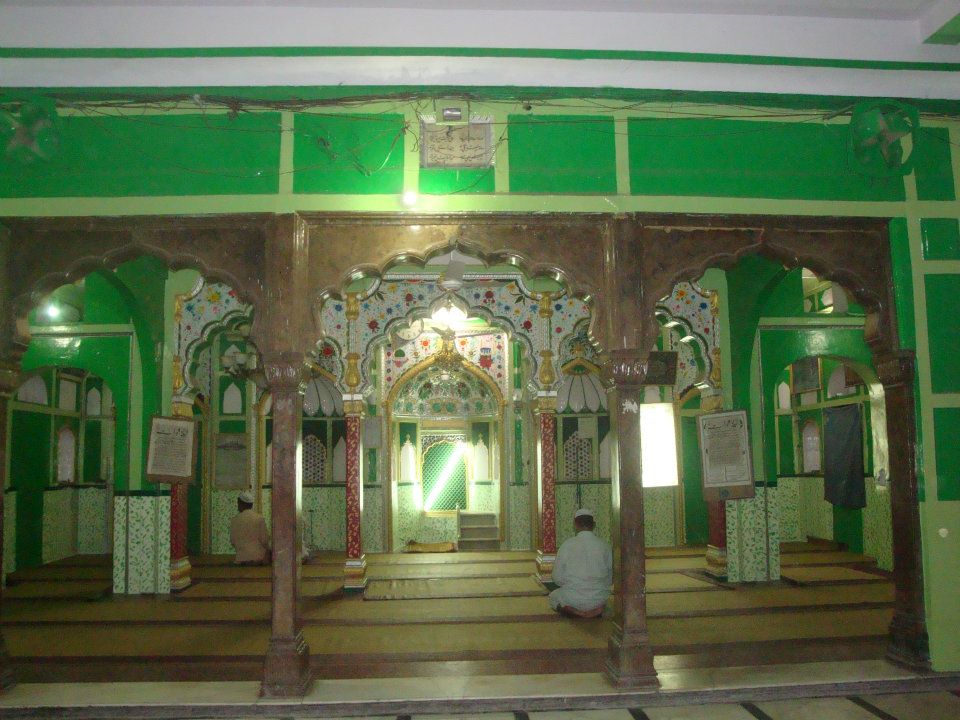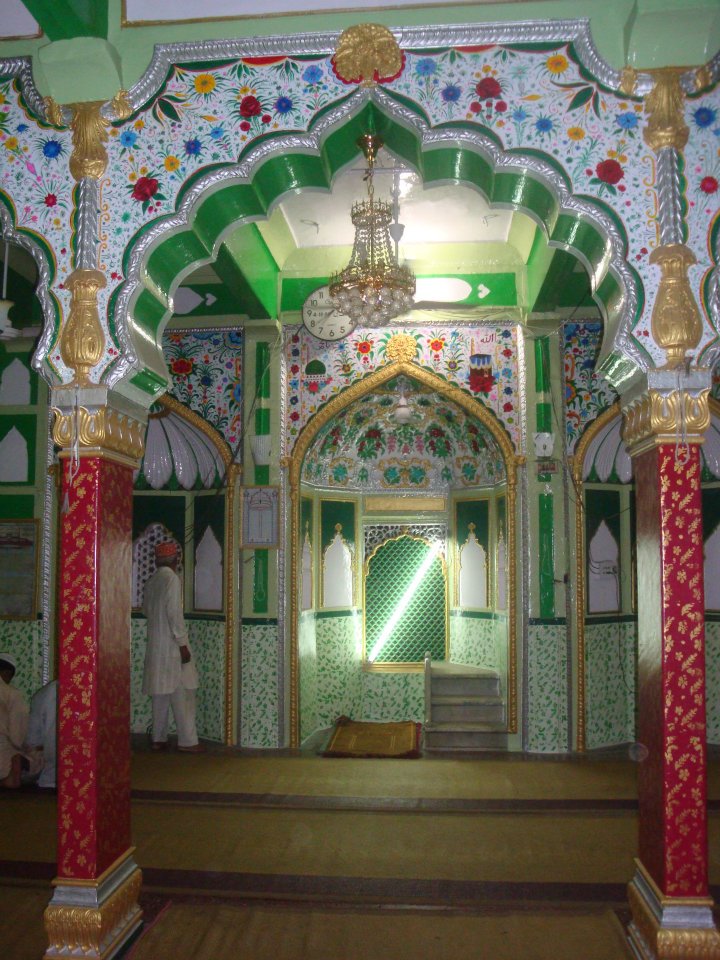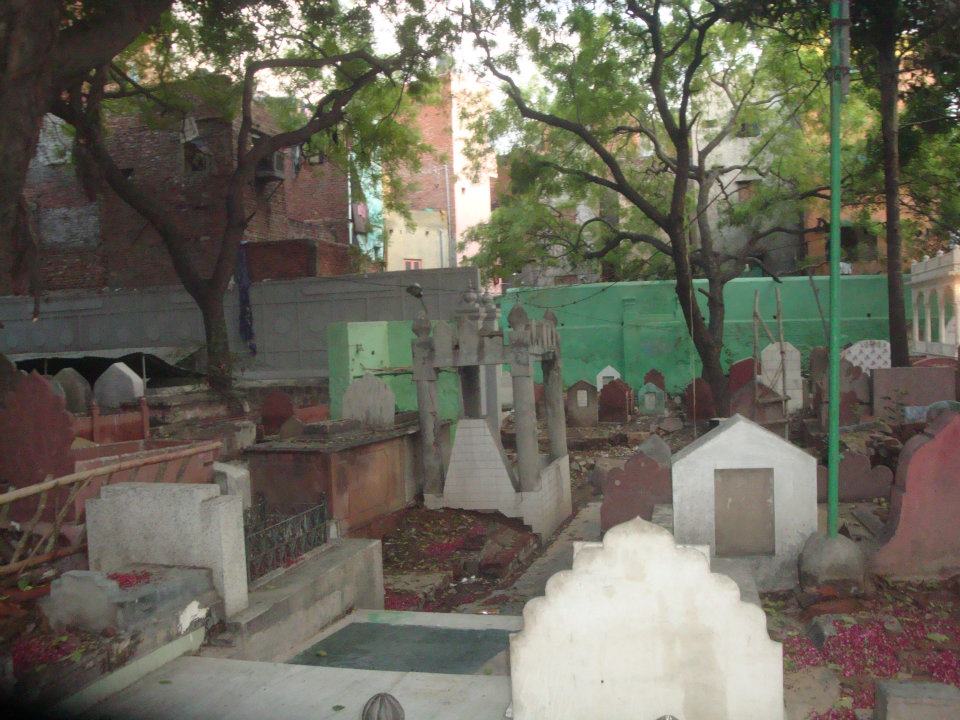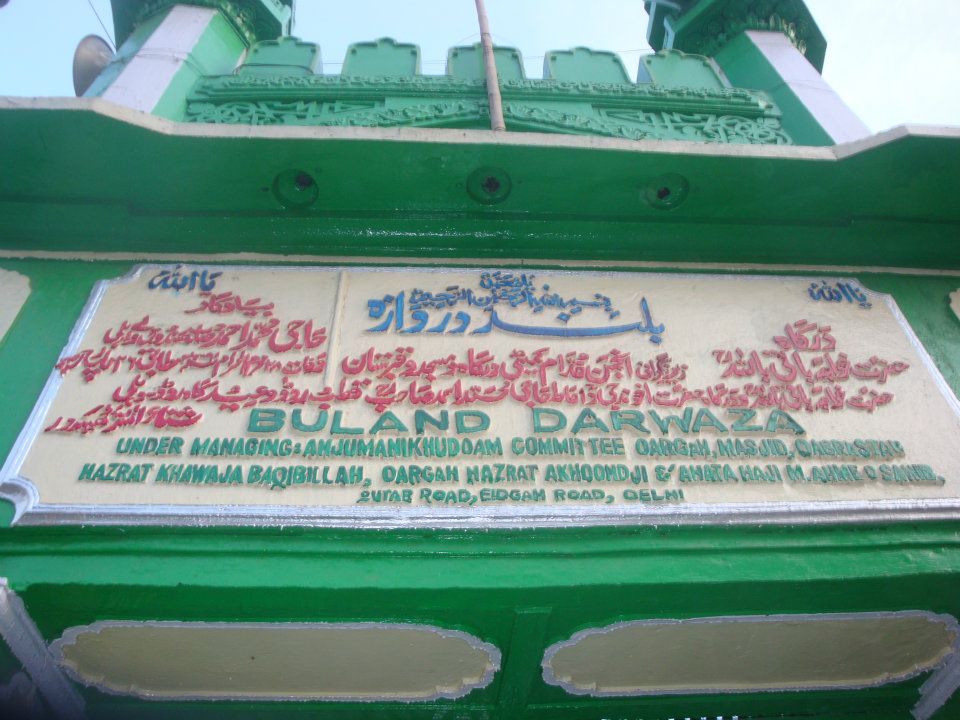Hadhrat Khwāja Muhammad Bāqī Billāh Berang Naqshbandī Ahrārī Dihlawīquddisa sirruhū (may his secret be sanctified) was a great Sufi master of the Naqshbandī-Ahrārī Sufi order, who established and propagated the Naqshbandī order in India.
He was born in Kābul (Afghanistan) in 971 or 972 AH. Some sources mention his date of birth to be 5 Zul-Hijjah. His father Qāzī Abd as-Salām Samarqandī was a pious saint and had Turkish ancestry, while his mother was a noble Sayyida. His father lived in Samarqand and later migrated to Kabul, where the venerable Khwāja was born. He was named by his parents “Muhammad al-Bāqī” and later became popular with the name “Bāqī Billāh”. His takhallus (pen name) was Berang (which literally means colorless or transparent).
He started his education with Mawlānā Sādiq Halwāī, and later traveled with him from Kābul to Māwarannahr (Transoxiana) and continued his education there.
For spiritual training, he accompanied several of the masters of Sufism in many places, including Māwarannahr, Afghanistan, Kashmīr, and India. Finally, he received the spiritual secret from Hadhrat Khwāja Muhammad Khwājagī Amkanagī. He later traveled to India and stayed for one year in Lahore, and then settled in Delhi.
The venerable Khwāja Bāqī Billāh had extreme humbleness and he never considered himself better than anyone. One notable display of his humbleness is reported as follows. A young person used to live in the neighborhood of Khwāja. He was very immoral and debauch person who often showed mischief and wickedness. Hadhrat Khwāja would tolerate his mischievous behavior with utmost patience. His murid Khwāja Hasām ad-Dīn however could not be so patient, and one day complained to the police inspector who arrested that young person and sent him to the prison. When Khwāja Bāqī Billāh heard about it, he was annoyed with Khwāja Hasām ad-Dīn and asked him why he had complained? Khwāja Hasām ad-Dīn replied: Shaykh! He is a very immoral and wicked person; his wickedness had exceeded the limits. On hearing this reply, Hadhrat Khwāja Bāqī Billāh made a cold sigh and said: “Yes brother! You consider yourself pious, saintly and good folk, and that is why that person seemed to you immoral and wicked. I do not see myself in any way better and different to him.” After this, he freed that person from the prison, who was ashamed and became pious and well-behaved.
The noble Khwāja was a firm follower of the Ahl as-Sunnah creed and often emphasized this in his teachings. While explaining the meanings of Sūrah al-Fātiha, he describes the meaning of Sirāt al-Mustaqīm (the straight path) in the following words:
“It is a consensus of the truthful and the qualified researchers that the straight path [Sirāt al-Mustaqīm] is the path of Ahl as-Sunnah wal-Jamā’ah.”
The venerable Khwāja passed away on Saturday 25 Jumādā al-Akhira 1012 AH (29 November 1603) before sunset, at the age of forty years. He was buried on the next day the 26th of Jumādā al-Akhira. His final resting place is a Sufi shrine in Delhi, visited by thousands of his followers and lovers.
Descendents and deputies
Hadhrat Khwāja Bāqī Billāh quddisa sirruhu married with two women and had two sons, one from each of them. His first wife was sister of Muhammad Qalīj Khān Andajānī (d. 1023 AH) who was a reputed official during the Akbar’s rule and used to teach Fiqh, Hadīth and Tafsīr. His second wife was possibly sister of Muhammad Sādiq Kashmīrī (or Kishmī).
When the venerable Khwāja passed away in 1012 AH, he left behind his noble mother, his two wives, and two sons who were only about two years old. His deputy Khwāja Hasām ad-Dīn Ahmad took the responsibility of the family and raised the children.
His elder son Khwāja Ubaid-Allāh was born on 1st Rabī’ al-Awwal 1010 AH and passed away on 18 Jumādā al-Akhirah 1073 AH. He is usually referred to as “Khwāja Kalān”, meaning the elder khwāja. Some pious person saw in a dream that a son will be born to the venerable Khwāja and will be named after the name of Khwāja Ubaid-Allāh Ahrār quddisa sirruhu. Thus when he was born, he was named Ubaid-Allāh.
The venerable Khwāja’s younger son Khwāja Abd-Allāh was born on 6th Rajab 1010 AH and was four months younger than his brother. He is usually called “Khwāja Khurd”, meaning the younger khwāja. When he reached adulthood, he entered the service of Imām Rabbānī Shaykh Ahmad Sirhindī and received the spiritual mentoring and was awarded deputyship by Imām Rabbānī. He passed away on 25 Jumādā al-Awwal 1074 AH.
Among the deputies of the venerable Khwāja is the sun of spirituality and the founder of the Mujaddidī order, Imām Rabbānī Shaykh Ahmad Sirhindī Fāruqīradiy-Allāhu anhu, from whom the sacred Naqshbandi order spread to the whole world. The names of his known deputies are the following:
- Imām Rabbāni Mujaddid Alf-i Sāni Shaykh Ahmad Sirhindi Fāruqi
- Shaykh Tāj ad-Dīn Usmānī Sanbhalī, the first deputy of the venerable Khwāja. He migrated to Makkah, where he died in beginning of the night preceding Saturday 22 Rabī’ al-Awwal 1052 AH age the age of about ninety nine years, and was buried in his place near Makkah. He had numerous disciples in the Arab countries. He also left behind many deputies, among them were Shaykh Abd-Allāh Bāqīshar al-Makkī and Shaykh Abu Sa’īd Gangohī.
- Khwāja Hasām ad-Dīn Ahmad (born in 977 AH, died on 1st Safar 1043 AH, buried in Delhi)
- Shaykh Ilāh-Dād Dihlawī (died on 23rd Sha’ban 1051 AH, buried in Delhi)
- Shaykh Usmān Jālandharī, author of “Ishqiya”
- Shaykha Dawlat, wife of one of his murids. She was given permission to teach the Naqshbandī Zikr to women.
Legacy
The venerable Khwāja Bāqī Billāh was an excellent poet and has left many small and large poems and verses. Most of his poetry is in the style of Masnavī. He used the takhallus (pen name) Berang.
His malfūzāt (speeches) were transcribed and collected by one of his beloved disciples, who intentionally did not mention his name. However, he used the pen name Rushdī and is referred to by the biographers as Mawlānā Rushdī. He also described some of the important life events of the venerable Khwāja.
The maktūbāt (letters) of the venerable Khwāja were collected and eighty seven of them are available, called Ruq’āt. He also wrote short essays which are included in the collection “Kulliyāt-i Bāqī Billāh” and listed below:
- Haqīqat-i Namāz (the reality of salvh)
- Mukhtasir Bayān-i Tawhīd (short description of Tawhīd)
- Ma’nā A’ūz (meaning of the verse A’ūzu Billāh)
- Tafsīr of Bismillāh and Sūrah al-Fātiha
- Tafsīr of Surah ash-Shams
- Tafsīr of Surah al-Ikhlās
- Tafsīr of Surah al-Falaq
- Tafsīr of Surah an-Nās
- Sharh-i Rubā’iyāt alias Silsilat al-Ahrār, written in 1007 AH
The next in the Naqshbandī Mujaddidī Tāhirī spiritual golden chain is Imām Rabbānī Mujaddid Alf-i Sānī Shaykh Ahmad Sirhindī.
References
- Hadhrāt al-Quds, by Shaykh Badr ad-Dīn Sirhindī, Urdu translation by Hāfiz Muhammad Ashraf Naqshbandī, published by Qādrī Rizwī Kutubkhāna, Lahore, 2010.
- Zubdat al-Maqāmāt, by Khwāja Muhammad Hāshim Kishmī
- Bāqiyāt-i Bāqī (Urdu), by Dr. Ghulām Mustafā Khān Naqshbandī
- Tazkirah Khwāja Bāqī Billāh (Urdu), by Mawlānā Nasīm Ahmad Farīdī Amrohī, published from Lucknow, India, 1986.
- Mashāikh-i Turuq-i Arba’a (Persian), by Khwāja Bāqī Billāh Naqshbandī, published by Dr. Ghulām Mustafā Khān Naqshbandī, 1969.
- Kulliyāt-i Bāqī Billāh (collection of poetry, speeches and letters, etc.) in Persian, by Mawlānā Abul-Hasan Zaid Fārūqī Mujaddidī, published from Lahore, Pakistan.
The holy shrine of Hazrat Khwaja Baqi Billah, with a view of his grave inside. Qutub Road, Delhi, India.
